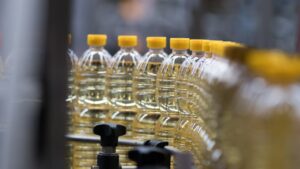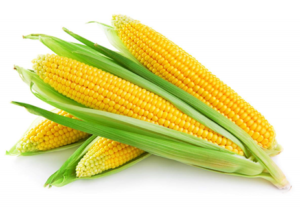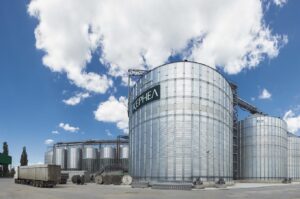
Kernel, one of Ukraine’s largest agricultural holdings and elevator operators, is focusing its current investment activities on specific technological solutions for the development of its elevator network and will implement its own engineering developments at these facilities, said Sergey Shcherban, head of Kernel’s storage department, at the Grain Storage Forum in Kyiv on Friday.
The expert noted that the construction of new large facilities in the format of “sand elevators” (projects “from scratch” – IF-U) currently requires a long investment cycle – from 8 to 10 years. In this regard, the company is directing its available capital budget (CAPEX) toward improving the efficiency of existing assets.
“Our budget is specifically targeted at specific technological solutions. In particular, we have developed our own grain recuperator, which we plan to install at least at two elevators in cooperation with the Sokol company. This development will save 20% of energy when drying grain in certain types of dryers,” Shcherban explained.
According to him, Kernel will soon begin producing its own cleaning equipment. The agricultural holding’s specialists have developed a machine for cleaning, calibrating, and sorting grain, which allows working with raw materials of any quality.
“We have acquired the technology, and now this equipment is being put into practice. The recuperator and cleaning machine are our own designs. We need to approach the solution of non-standard problems of agricultural producers through process optimization,” emphasized the head of the department.
Kernel is the world’s largest producer and exporter of sunflower oil, the largest exporter of grain from Ukraine, and a leading producer of grain and oilseeds in Ukraine. It is one of the largest producers and sellers of bottled oil in Ukraine. It is engaged in the cultivation and sale of agricultural products.
Kernel is the largest operator in the grain storage market in Ukraine. It has a network of more than 60 elevators with a one-time storage capacity of about 3.5 million tons. Its main assets are concentrated in the Poltava, Cherkasy, Chernihiv, Sumy, and Kirovohrad regions. The agricultural holding’s logistics infrastructure is supported by assets in the ports of Chornomorsk, including the powerful Transbalkterminal grain terminal (over 190,000 tons of storage capacity) and a stake in the Olymp terminal.
In fiscal year 2025 (FY, July 2024 – June 2025), Kernel supplied 8 million tons of agricultural products to the global market. The agricultural holding company earned $238 million in net profit, which is 42% more than in FY 2024. Kernel’s consolidated revenue in FY 2025 reached $4.115 billion, which is 15% more than in the previous financial year.
The company’s debt obligations at the end of September amounted to $726 million, including bank credit lines of $104.5 million compared to $146.7 million at the beginning of the year.

Kernel, one of Ukraine’s largest agricultural holdings, has discussed new opportunities for development in the EU market and agreed on prospects for deepening its partnership with Spanish sunflower and olive oil supplier Aceites Abril, the agricultural holding’s press service reported on Facebook.
It is noted that the topic of the meeting in Orense (Spain) was the expansion of vegetable oil supplies to Europe and the adaptation of logistics. The parties discussed the range, potential volumes, and practical solutions to ensure the stability and predictability of exports.
“We talked about specific things: logistics, supply flexibility, and opportunities to expand the range for the EU. It is important for us to build predictable, long-term models of cooperation. We continue to develop partnerships in the EU, focusing on supply stability, effective commercial solutions, and long-term mutually beneficial cooperation,” said Andriy Paladiy, director of oil and protein trading at the agricultural holding, whose words are quoted in the report.
Founded in 1962, Spanish company Aceites Abril S.A. is one of Spain’s leading family-owned vegetable oil producers. It specializes in the production of Extra Virgin and Virgin olive oil, as well as sunflower, soybean, and grape seed oil. The company owns a factory in the industrial zone of San Sibao das Vinhas and its own logistics terminal in the port of Vigo, which exports products to more than 60 countries around the world. The company is consistently among the ten largest players in the industry in Spain.
Before the war, the Kernel agricultural holding company ranked first in the world in sunflower oil production (about 7% of global production) and exports (about 12%). It is one of the largest producers and sellers of bottled oil in Ukraine. It is also involved in the cultivation and sale of agricultural products.

Kernel, one of Ukraine’s largest agricultural holdings, processed 995,000 tons of oilseeds in the second quarter of fiscal year 2026 (FY, October-December 2025), which is 2% more than in the same period last year and 78% more than in the previous quarter, the agricultural holding reported in its quarterly report.
It specified that sunflower seeds accounted for 85% of the total volume, with the remainder being soybeans, which were processed to partially offset the impact of limited availability of sunflower seeds on the domestic market.
According to the agricultural holding, oilseed processing volumes in July-December 2025 decreased by 6% compared to the same period last year, to 1.6 million tons, which is a result of a decrease in processing volumes under tolling agreements compared to the corresponding figure a year ago.
Sales of Kernel edible oil in the second quarter of 2026 amounted to 411 thousand tons, which is at the level of the same period last year, but the total figure for the first half of the year exceeded the result for the same period a year ago by 30% due to higher oilseed processing volumes. Bottled sunflower oil accounted for 17 thousand tons of total sales.
Silos received 2.3 million tons in the second quarter of 2026 FY, reaching 3.5 million tons in the first six months of 2026 FY.
“The 35% increase on an annualized basis was supported by higher overall grain availability due to increased corn yields in the group’s own agricultural segment, as well as increased grain consumption from third-party suppliers,” the agricultural holding explained.
Kernel’s grain exports reached 1.5 million tons in the second quarter of FY 2026, up 21% from the previous quarter. On an annualized basis, volumes increased by 10%, mainly reflecting the low comparative base of the previous year. The agricultural holding added that overall export rates remained limited due to delays in the harvesting campaign and continued slow sales to farmers.
The throughput capacity of Kernel’s export terminal in the second quarter of 2026 FY was 2.5 million tons, up 35% compared to the previous quarter. Grain crops accounted for 71% of total shipments, edible oils for 16%, and vegetable meal for the rest.
“At the same time, over the six months, the throughput capacity of the terminals decreased by 11% compared to the same period last year amid intensified Russian attacks on Ukrainian ports on the Black Sea and the Danube in the Odesa region, which led to prolonged disturbances and disruptions in the operation of the group’s terminals,” the agricultural holding stated.
Kernel recalled that in October-December 2025, Russian drones twice damaged the group’s port infrastructure in the Odesa region, including vegetable oil storage tanks and a number of production facilities. Preliminary estimates indicate a loss of approximately 500 tons of sunflower oil.
Before the war, Kernel was the world’s leading producer of sunflower oil (about 7% of global production) and its exporter (about 12%). It is one of the largest producers and sellers of bottled oil in Ukraine. It is also involved in the cultivation and sale of agricultural products.

The state-owned Oschadbank has signed a series of loan agreements with companies belonging to the Kernel Group for a total amount of $77 million, which, according to the bank, is the largest amount of lending to private businesses among Ukrainian banks in 2025.
“The development of Ukraine’s agricultural export potential is an important aspect of strengthening the state’s economy. This is the main focus of Kernel’s business and one of Oschadbank’s priorities,” said Yuriy Katsion, deputy chairman of Oschadbank’s board responsible for corporate business, on Facebook.
According to a press release from the bank, almost half of the lending volume may be directed toward investment needs: these are non-revolving credit lines of $36.7 million with a term of seven years.
It is noted that the funds may also be used to upgrade the fleet of agricultural machinery and equipment to ensure uninterrupted cultivation of agricultural land, as well as to finance and refinance capital expenditures related to the reconstruction of the Transbalkterminal grain terminal (Chornomorsk), which was damaged as a result of a Russian missile attack in 2023.
Another feature of the agreement is the borrower’s right to draw down the entire credit limit of $77 million during the term of the agreement to replenish working capital, provided that the limits provided for investment lending are reduced, the bank said.
It is specified that the replenishment of working capital may be carried out by the group’s companies, in particular, for the purchase of grain, fertilizers, plant protection products, fuels and lubricants, other goods, works, and services.
Before the war, Kernel was the world’s leading producer of sunflower oil (about 7% of global production) and its exporter (about 12%). It is one of the largest producers and sellers of bottled oil in Ukraine. In addition, it is engaged in the cultivation and sale of agricultural products.
In fiscal year 2025 (FY, July 2024 – June 2025), Kernel earned $238 million in net profit, which is 42% more than in FY 2024. Kernel’s consolidated revenue in FY2025 reached $4.115 billion, an increase of 15% compared to the previous fiscal year.
The company’s debt obligations at the end of September amounted to $726 million, including bank credit lines of $104.5 million, compared to $146.7 million at the beginning of the year.
As reported, in October 2025, Oschadbank’s corporate segment loan portfolio grew by 2.6%, or UAH 26.9 billion, to UAH 970.1 billion. Hryvnia loans to businesses added 1.7%, or UAH 11.5 billion, reaching UAH 689.7 billion, while foreign currency loans increased by 4.2%, or $267 million, to $6.68 billion.
According to the NBU, at the beginning of November this year, Oschadbank, with total assets of UAH 456.23 billion, ranked second among 60 banks in terms of this indicator.

Kernel, one of Ukraine’s largest agricultural holdings, sold 499,000 tons of grain and oilseeds in July-September 2026 (FY, July 2025-June 2026), sold 499,000 tons of grain and oilseeds, with wheat accounting for 89% of the volume, the agricultural holding reported in its quarterly report.
“Profitability was further supported by favorable price conditions on the grain market, which helped to compensate for uneven yields in different regions,” the agricultural holding noted.
The agricultural holding named unfavorable weather conditions, which shifted the development phases of both grain and oilseeds, among the main features of the 2025 season. Two late spring frosts affected the growth of winter and early spring crops. A prolonged cool spring and summer with sharp fluctuations in day and night temperatures slowed plant growth in the northern regions. In the central regions, a constant shortage of soil moisture and limited rainfall hampered crop development and contributed to their premature wilting and early ripening.
According to published statistics, Kernel allocated 172,000 hectares to corn in the 2025 season, which is 98% more than last year. and thanks to a yield of 9.2 t/ha compared to 8.4 t/ha a year earlier, a gross harvest of 1,584 thousand tons was obtained, which is 18% more than last year.
In 2025, 94,000 hectares were planted with wheat (+1% compared to 2024), with a yield of 5.9 tons/hectare (-3%), resulting in 552,000 tons (-1%). The agricultural holding allocated 46 thousand hectares (-31%) for sunflowers, with a yield of 2.7 t/ha (-4%) and a gross harvest of 124 thousand tons (-33%). The area under soybeans was reduced by 44% to 22,000 hectares this year, while the yield increased by 7% compared to last year and amounted to 2.3 tons/hectare, which allowed for a gross yield of 54,000 tons (-65%). In 2025, the agricultural holding allocated 22,000 hectares for the cultivation of rapeseed, other secondary crops, and fallow land, which is 44% less than last year’s volumes.
As of the end of September, Kernel had completed the harvesting of wheat, sunflower, and soybeans on 100% of its production areas, while corn was harvested from 87% of the areas.
At the same time, the agricultural holding completed the sowing of winter crops for the 2026 harvest and sowed winter wheat on 84,000 hectares and winter rapeseed on 38,000 hectares.
Before the war, Kernel was the world’s leading producer of sunflower oil (about 7% of global production) and its exporter (about 12%). It is one of the largest producers and sellers of bottled oil in Ukraine. In addition, it is engaged in the cultivation and sale of agricultural products.

Kernel, one of Ukraine’s largest agricultural holdings, exported 1.3 million tons of grain in July-September 2026 (FY, July 2025-June 2026) exported 1.3 million tons of grain, which is 15% less than in the same period last year, but 27% more than in the previous quarter, thanks to greater availability of grain on the domestic market after the start of the winter wheat harvest.
According to the published quarterly report, wheat accounted for 74% of Kernel’s total exports, with the rest being corn and barley.
“The start of the new financial year for the Infrastructure and Trade segment was shaped by two key market dynamics: a delay in the harvesting campaign in Ukraine caused by weather conditions and slower-than-usual sales by farmers,” the agricultural holding said.
As a result, the cargo turnover of export terminals in the first quarter of FY 2026 amounted to 1.8 million tons, which is 17% less than in the same period last year, leading to a decrease in grain exports and the group’s overall sales portfolio of vegetable oils and meal.
Grain accounted for 75% of the total cargo turnover, edible oils for 13%, and vegetable meal for the rest.
The volume of grain received by silos in July-September 2026 FR amounted to 1.2 million tons, which is 34% less than in the previous year. Of this amount, 796 thousand tons were received from the agricultural holding’s own agricultural enterprises, and the rest from third-party suppliers.
“The decrease in arrivals mainly reflects the later start of the group’s harvesting campaign, as unfavorable weather conditions and uneven ripeness of crops in different regions delayed and reduced deliveries to warehouses,” Kernel explained.
The Infrastructure and Trade segment generated EBITDA of $20 million in the first quarter of 2026 FY, down 62% from the previous year.
Before the war, Kernel was the world’s leading producer of sunflower oil (about 7% of global production) and its exporter (about 12%). It is one of the largest producers and sellers of bottled oil in Ukraine. In addition, it is engaged in the cultivation and sale of agricultural products.